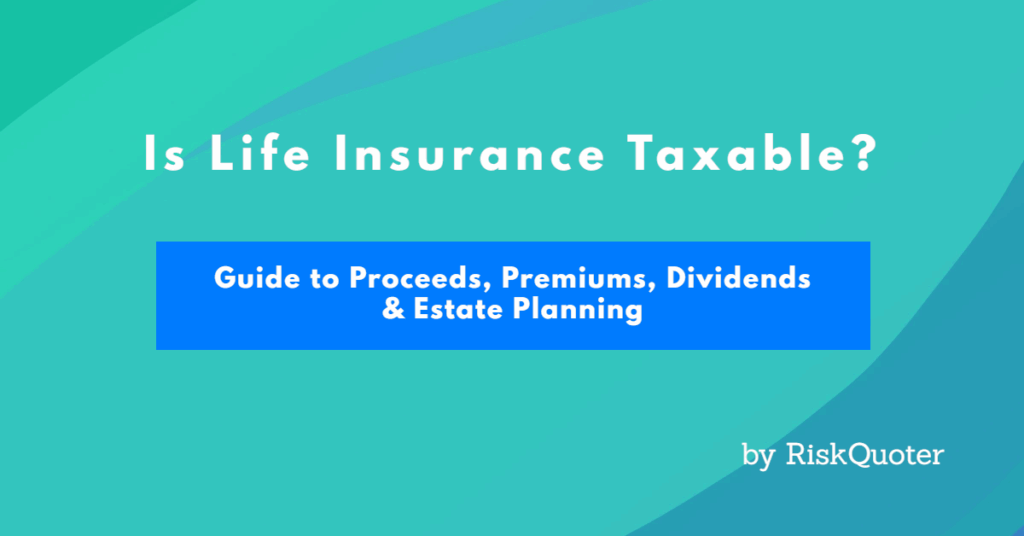The Bottom Line Up Front—Most life insurance benefits are tax-free. But (and this is a big but)… certain ownership setups, dividend handling, or estate planning mistakes can create surprise taxes.
This guide will cover:
- Are life insurance proceeds taxable?
- Are premiums or payments tax-deductible?
- Are dividends taxable?
- And how life insurance affects estate taxes and retirement tax planning.
We’ll help you find the best life insurance companies for your situation, and we can help you even if you have a high-risk medical condition that requires underwriting expertise.
Disclaimer (Read This First)
The information provided here is for educational purposes only and should not be considered tax, legal, or financial advice. Always consult with a qualified CPA, tax advisor, or attorney before making any decisions related to life insurance and taxes.
Are Life Insurance Proceeds Taxable?
Short answer: Usually not.
When Proceeds Are Not Taxable:
- Lump-sum death benefits – Not subject to income tax
- Beneficiaries – Generally receive the payout tax-free, regardless of the amount.
It doesn’t matter if the policy is a term life insurance policy, universal, or whole life. The rules remain the same.
When Proceeds Might Be Taxable:
- Business-owned policies – Without meeting IRS notice/consent requirements, death benefits may be subject to income tax.
- Transfer for value rule – Selling or transferring a policy for money can cause the death benefit to become partially taxable.
- Interest earnings – If the insurance company holds the death benefit proceeds and pays interest to the beneficiary, the interest is taxable.
- Estate tax – If the insured owned the policy, the full death benefit may be included in the taxable estate.
Are Life Insurance Premiums Tax-Deductible?
For Individuals? No. Personal life insurance premiums are not deductible.
For Businesses? Premiums for key-person, buy-sell, or personally owned policies are not deductible. In some cases, group life insurance premiums (up to $50,000 per employee) may be deductible as a business expense. (More on business premiums later in this article)
Are Life Insurance Dividends Taxable?
Usually not. Dividends are treated as a return of premium and are tax-free up to the total premiums paid. Exceptions:
- Dividends received in excess of premiums paid may be taxable.
- If interest is earned on the dividends, the interest portion is taxable.
How Does Life Insurance Affect Estate Taxes and Estate Planning?
With the federal estate tax exemption of $13+ million per person, estate taxes are more of a concern for high-net-worth individuals.
When Life Insurance Is Included In Your Estate
Certain factors may cause your life insurance to be included in your estate.
- You own the policy at the time of your death.
- Your estate is the beneficiary.
- You transferred ownership within 3 years of death.
- You have a business-owned policy that is incorrectly structured.
Important to note is that you may have to contend with estate taxes in your state of residence.
When It Can Be Kept Out of the Estate
- Irrevocable Life Insurance Trust (ILIT) owns the policy.
- Another person or business owns the policy.
- Ownership transferred more than 3 years before death.
Business Life Insurance and Tax Deductibility
General Rule: Business-paid premiums are not deductible if the business is the beneficiary or has an ownership interest in the policy.
Limited Exception? If you are getting an SBA loan, and the lender requires life insurance as collateral for the loan, and the business is not the beneficiary, premiums may be deductible.
Bottom line: You need to speak with your CPA about this, as there are rules and requirements that you must meet to consider deducting this expense.
Advanced Tax Traps to Avoid
Look out for the following:
- The Triangle Problem – If the owner, insured, and beneficiary are three different parties, there is a potential gift tax problem.
- Modified Endowment Contracts (MECs) – If your universal or whole life policy is designated as a MEC, withdrawals and loans become taxable, and you may face an additional 10% penalty if under age 59-1/2.
- Policy Exchanges with Loans – IRC Section 1035 allows tax-free exchanges from one policy to another, but you may create a taxable event if not properly handled.
Can Life Insurance Lower Taxes in Retirement?
A tax diversification strategy uses life insurance policies to supplement retirement income.
If used properly, a cash value universal life insurance or whole life insurance policy:
- Tax Deferred Growth – the cash values of your policy are not taxable.
- Withdrawals – Withdrawals up to your basis (premiums paid) are tax-free.
- Loans – You can use policy loans tax-free if the policy remains in force and is not a MEC.
Life insurance can help balance against accounts you pay taxes on now, such as brokerage accounts, 401 (k) accounts, CDs, real estate, etc.
FAQ
Usually not. Death benefits are generally income tax-free to beneficiaries, but may be included in the insured’s taxable estate.
No. Personal premiums are not deductible. Certain group life insurance premiums or collateral-assigned policies might qualify under specific business situations.
Not usually. Dividends are tax-free unless they exceed premiums paid or earn taxable interest.
It depends. Improper transfers can cause gift taxes or trigger the transfer-for-value rule, making the death benefit partially taxable.
Not while it grows inside the policy. You can take tax-free loans and withdrawals up to your basis if the policy remains in force.
Yes. Certain policies can provide tax-free retirement income through loans and withdrawals, while also diversifying your overall tax exposure.
Final Thoughts
For most families, life insurance provides tax-free financial protection.
But as your financial situation becomes more complex—business ownership, high-value estates, or advanced retirement planning—it’s easy to hit tax pitfalls.
Get the right advice before you buy or change your policy structure.
Next Step – Contact us for a custom quote or to discuss how to set up your life insurance policy the right way—before tax mistakes happen.

